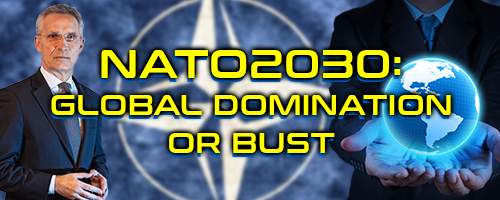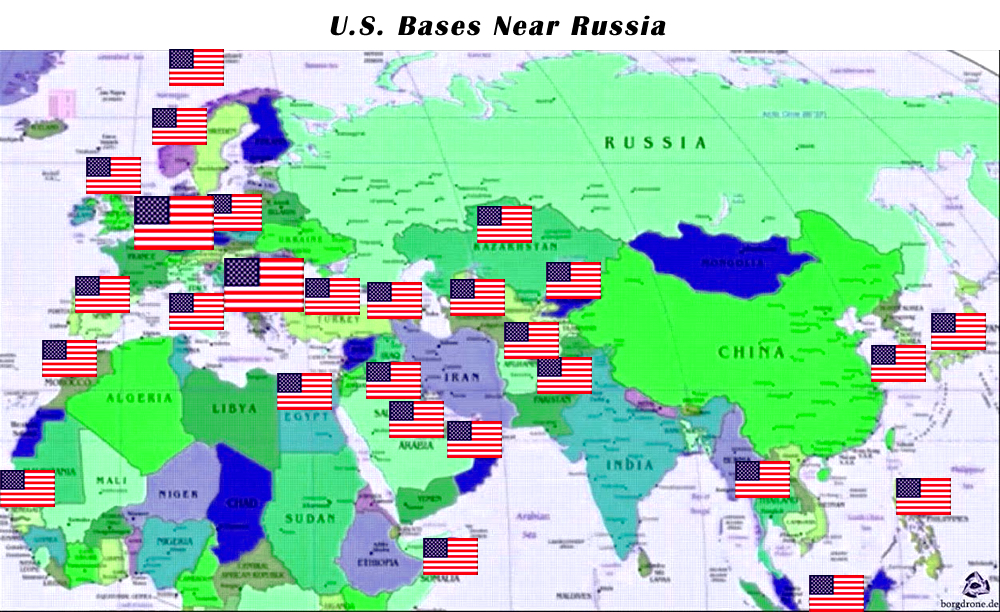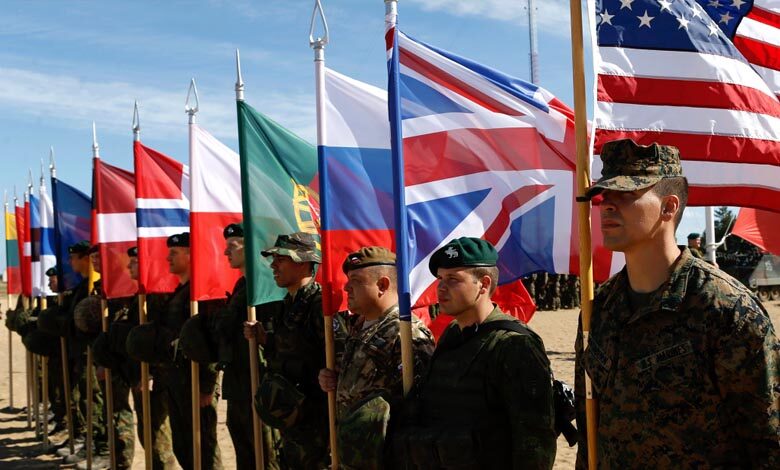
NATO: Don’t Buy the Myth, Don’t Buy the Hype
Ron Jacobs / CounterPunch
(September 15, 2023) — Things are often not what they seem to be. Or what we are told they are. This verity holds especially true when it comes to wars of empire. The current conflict between Russia and Ukraine is no exception. In fact, it can be quite reasonably argued that this conflict is one of the most misrepresented conflicts in the history of modern war.
Perhaps the grossest misrepresentation is the idea that this war is only between the two aforementioned militaries and has nothing to do with the great power conflict between Washington and Moscow. Of course, this portrayal serves the needs of those behind Ukraine’s turn from peaceful coexistence with its Russian neighbor to a policy of militarization and false diplomacy.
In other words, this portrayal serves Washington, NATO and the war industry that profits from their policies of war and the threat of war. In addition, it continues the false but feel-good narrative proffered by the US war machine that its celebration of military madness is somehow a positive phenomenon for the earth and its inhabitants, especially those bearing the brunt of its munitions.
It is somewhat disheartening, but certainly not surprising, that certain individuals and groups on the Left are accepting the narrative regarding Ukraine put forth by Washington and NATO. From where I sit, these folks do not constitute a majority of the rather minuscule US Left, but they do have access to resources well beyond their numbers.
In addition, because of their support for the shipment of US/NATO weapons to Ukraine combined with their rejection of peace talks, these folks receive whispered agreement from the Democratic wing of the US war machine both in and out of the government.
Of course, most of these leftists deny they are in tandem with US imperial motives in their statements; statements which briefly mention their opposition to US imperialism before focusing on Moscow’s considerably less sophisticated and less universal version of empire-building. Then comes the support for US arms shipments (whatever Kyiv wants) phrased in what has to be intentionally naive language that essentially explains away or ignores history. That history describes Washington’s plans to install a government in Ukraine open to assimilation into Washington’s realm via NATO.

The dismissal of this history makes the description of this war as some kind of war of liberation easier, but still quite an incredible stretch of the facts.
Fortunately, there are many others who understand this conflict in less simplistic terms. The thoughts and explications of some of them can be found in a recently published book titled Natopolitanism: The Atlantic Alliance since the Cold War.
This collection of essays and documents regarding NATO’s role as the military wing of US capitalism and its increasingly aggressive approach to that role is important and (obviously) timely. Although the writers are mostly from the left side of the political spectrum, not all are. Indeed, a series of cables written by the former US diplomat (and now head of the CIA) William Burns that was released by Wikileaks in 2008 makes it quite clear that Washington’s intent was always to provoke Moscow.
As Burns states in one of the cables, “Nyet means nyet.” His remarks are in regards to Washington’s aggressive assimilation of eastern European governments into NATO. He further notes that the right sector in Ukraine was using the NATO umbrella to restore glory to Ukrainian fascists. Of course, the world has seen much more of this since the simmering conflict between Moscow and Kyiv went hot in 2022.
Other sections of the book refer to Russia’s desire to set up a security arrangement that would include Russia and Europe while replacing NATO. No US administration has ever desired such an agreement, mostly because it would place Europe on an equal par with Washington and Russia on equal par with Europe.
The United States has never seriously considered such an idea. In fact, since its beginnings, NATO was designed to prevent such a thing from happening. As this text hints at, NATO’s expansion beyond Europe strongly suggests that Washington will combat any security arrangements anywhere in the world unless the nations involved put Washington at their head. Regis Debray puts it this way in his essay titled “Why France Should Leave NATO:” the US doesn’t have allies, it has clients.
The text takes the reader on a course that begins with the text’s editor Grey Anderson’s observation that “At first blush, a congeries that included (the fascist) Estado Novo and French colonial Algeria in the ranks of its founding members might not be thought an advertisement for democratic virtue.” (4) It ends with the observation from Thomas Meaney’s 2022 article that: “At a time when there has never been more need for an alternative world order, NATO closes the door on that possibility. NATO may be back. But it is only to hoist that old banner: “There is no alternative.” (354)
In the pages between, the reader is presented with a history of a nation seeking hegemony. It is a story that reveals political and economic manipulations that include covert operations, subversion, bribery and just plain overwhelming military force.

The essential element that becomes clear is that the empire-builders headquartered in Washington have always had a plan to ensure political, economic and military dominance. The fact that they have been fairly successful in convincing those nations in their hegemonic sphere that this is for their own good both defies the mind and reveals the general sophistication of its approach.
Regarding this, two essays here discuss NATO’s moves into Sweden, Finland and Ukraine. The part of the process that is most revealing is the discussion of what part of the population supported “joining” NATO and which part was more hesitant or against it. Both essays state that the demographic most in favor of joining NATO (in Ukraine and Sweden, anyhow) are the business class — bankers, corporate executives and those generally considered to be middle class.
Industrial workers, service workers and farmers, who would be negatively affected by the greater privatization of public services and land, tend to be less positive.
This fits with the understanding that sees Ukraine’s history since independence as a struggle between those who supported Russian capitalism and its investments and those who aligned themselves with the West’s promises of wealth. Wealth, I might note, that history proves is Washington’s to both enhance and to diminish according to the market it defends.
Natopolitanism is a text that should be read and discussed by anyone concerned about the never-ending expansion of the US war machine and the refusal of Washington and most of its clients to consider a peaceful path into the future. This is even truer for those on the Left, especially those whose understanding has them convinced not only that NATO’s escalation of the conflict in Ukraine is defined by the people of Ukraine, not Washington, but that peace negotiations are either unrealistic or pointless.
Accepting this perception is accepting NATO’s conception of the world; in other words, a world where NATO will always exist and decide our future. As if to emphasize this, Alexander Zevin ends his essay titled “A Normal War”: “A refusal to contemplate any alteration to a post-Cold War order forged in hubris by the victors is not toughness. It is warmongering.” (291)
Ron Jacobs is the author of Daydream Sunset: Sixties Counterculture in the Seventies published by CounterPunch Books. His latest offering is a pamphlet titled Capitalism Is the Problem. He lives in Vermont. He can be reached at: ronj1955@gmail.com.
Posted in accordance with Title 17, Section 107, US Code, for noncommercial, educational purposes.